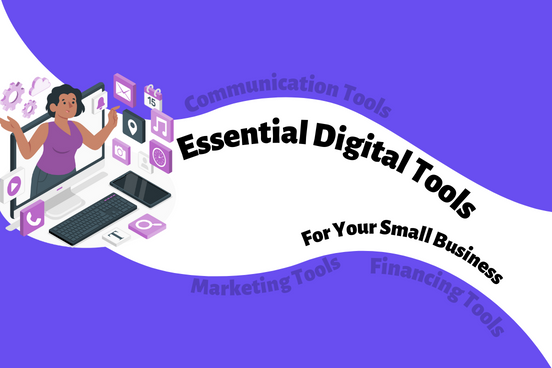5 Important Digital Tools for Small Businesses
| By Laura Castelli | 0 Comments

Starting a small business is daunting to say the least.
Picture this: a great idea for a business pops into your head one day.

Ready to launch now? Absolutely yes.
After months of hard work, you finally launch your business in high spirits. Then as your business grows, you are hit with an ever-growing mountain of things to do; from managing your employees to finances and every little detail in between. You are feeling overwhelmed and wondering how you will ever get on top of this mountain.
No worries, we’ve got you.
We know you’re extremely busy running your business so here are 5 of the most useful digital tools you can take advantage of:
Communication tools:
Communication is the key to any successful relationship whether that be with your employees or your customers. To help with this you could get…

- Devyce – 2 numbers, 1 phone
Devyce is a cost-effective and sustainable digital solution to the work phone.
It allows you to have an additional phone number on your phone to use for work communications. On average phones are replaced every two years [1] and each phone during its lifetime can create up to 110kg of CO2 per year [2]. Eliminate the use of a second phone and get Devyce.
Another great feature of Devyce is the team management portal for you to monitor and manage your employee call activity and quickly access call logs.
We know what you’re thinking, having your work communications operating on your personal phone might disrupt your personal life (or vice versa) however Devyce also has a handy ‘do not disturb’ feature where you can turn off work notifications to keep a healthy work life balance.
All these features make Devyce a great telecommunications tool for your small business!

- FreshDesk – A customer service software for your website
Maintaining an open line of communication with your customers can be harder than it seems.
Customers will reach out to customer support through multiple channels. This can become difficult to keep track of so let FreshDesk ‘delight your customers with effortless customer service’.
Financing tools:
One of the top reasons why startups/small businesses fail is a lack of cash or failure to raise new capital. [3] Sounds pretty obvious right? However, many business owners struggle to manage their finances and budgeting.
Don’t worry, you don’t need to be a financial expert to be able to start your own business (even accountants struggle with the papers sometimes). There are many digital tools to assist you. Spendesk being one of them.
- Spendesk – A 7-in-1 spend management tool
Spendesk encourages smarter spending decisions by providing:
- A management platform where you can view and manage spending from company cards
- Review and pay invoices
- Track expenses
- Generate financial reports
- Automate accounting
- Create and optimise budget plans for your business
Make smarter money decisions, budget better and stay on top of your finances with Spendesk.
Marketing tools:
Developing a solid marketing plan and creating great content for it is one of the key reasons for success for many businesses.
- BuzzSumo – an all in one content marketing tool
BuzzSumo is a hub platform where you can:
- Discover and research new content ideas
- Find relevant influencers to work with
- Industry trend updates
- Develop your content strategy and create compelling content
- Analytics for content engagement
This all inclusive platform is great for industry trend research, allowing you to create and optimise your content marketing strategy.
- Buffer – social media management tool
Buffer is a great tool for starting out with social media management as it offers a clear and easy to navigate platform for:
- Creating and scheduling social media posts
- Accessing all your social media messages across all platforms in one inbox
- Social media analytics
All of these features are great for effective communication with your audience, learning more about their preferences in regard to your business and utilising new insights to optimise your services and marketing plan.
So, will you be using any of these digital tools? Feel free to head to our socials to share your business story and what digital tools you’re currently using!
References:
[1]
[2]
[3]
https://www.cbinsights.com/research/startup-failure-reasons-top/







